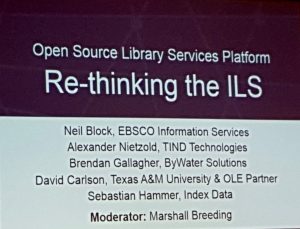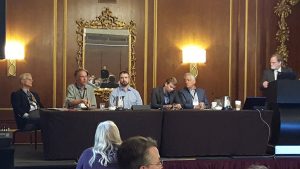Koha ILS
ByWater at the EBSCO User Group Meeting
 A couple of weeks ago we had the privilege of being part of a panel at the EBSCO User Group Meeting in Boston, MA. The discussion, titled “Re-thinking the ILS” focused on the new interface EBSCO, in cooperation with other Open Source companies and developers, is creating. This will be a pluggable tool to bring all of a library’s third party products and services into one easy to navigate interface. This solution will provide libraries with the options to use services from various companies while still enjoying the cohesive library services platform interface that is often only available if you put “all of your eggs in one basket”. The panel, moderated by Marshall Breeding, also included Neil Block, VP of Open Source Innovation, from EBSCO, Sebastian Hammer, President of Index Data, David Carlsonof Texas A&MUniversity to discuss Kuali OLE, Alexander Nietzold, CEO and Co-founder of TIND, and of course our own Brendan Gallagher of ByWater. The panel was very well presented and the audience of 100+ was extremely responsive to the topic and had lots of great questions and comments. EBSCO really let the panelists drive this conversation which really spoke to their commitment to release this project as open source and make it a community driven project.
A couple of weeks ago we had the privilege of being part of a panel at the EBSCO User Group Meeting in Boston, MA. The discussion, titled “Re-thinking the ILS” focused on the new interface EBSCO, in cooperation with other Open Source companies and developers, is creating. This will be a pluggable tool to bring all of a library’s third party products and services into one easy to navigate interface. This solution will provide libraries with the options to use services from various companies while still enjoying the cohesive library services platform interface that is often only available if you put “all of your eggs in one basket”. The panel, moderated by Marshall Breeding, also included Neil Block, VP of Open Source Innovation, from EBSCO, Sebastian Hammer, President of Index Data, David Carlsonof Texas A&MUniversity to discuss Kuali OLE, Alexander Nietzold, CEO and Co-founder of TIND, and of course our own Brendan Gallagher of ByWater. The panel was very well presented and the audience of 100+ was extremely responsive to the topic and had lots of great questions and comments. EBSCO really let the panelists drive this conversation which really spoke to their commitment to release this project as open source and make it a community driven project.
A great allegory was made during Neil’s presentation that gave me a good sense of what this new interface will provide: Neil described the traditional all in one system as being like a chest of drawers. Each drawer has a specific purpose and the cutouts in the dresser will only accept one size drawer in each opening. What this new interface will provide is more like a modular closet, where pieces can be moved around, interchanged, and shuffled to meet the ever changing needs of your library.
Each of the members of the panel went through their respective roles as they relate to this initiative and  discussed some of the current misconceptions in the marketplace regarding Open Source software. These included addressing the most common of these which relates to the idea that open source products cannot beadopted by libraries with a small IT staff. It was great to hear the other panelists, as well as Mr. Breeding confirm that in most cases, if you utilize a reputable company (like ByWater) to assist in the transition and support of these products they requirethe same if not less IT support and knowledge as do their proprietary counterparts. It was also refreshing to hear others acknowledge that Open Source is a very strong trend in the library world now, so much that many non-open source vendors are using the term “open” more in their PR and advertising. While this is frustrating to me, because they are anything but open, it is also a sign that open source products are beginning to gain considerable traction in the library world.
discussed some of the current misconceptions in the marketplace regarding Open Source software. These included addressing the most common of these which relates to the idea that open source products cannot beadopted by libraries with a small IT staff. It was great to hear the other panelists, as well as Mr. Breeding confirm that in most cases, if you utilize a reputable company (like ByWater) to assist in the transition and support of these products they requirethe same if not less IT support and knowledge as do their proprietary counterparts. It was also refreshing to hear others acknowledge that Open Source is a very strong trend in the library world now, so much that many non-open source vendors are using the term “open” more in their PR and advertising. While this is frustrating to me, because they are anything but open, it is also a sign that open source products are beginning to gain considerable traction in the library world.
All in all it was a great panel and everyone in attendance learned a great deal about open source!
Read more by Nathan Curulla

